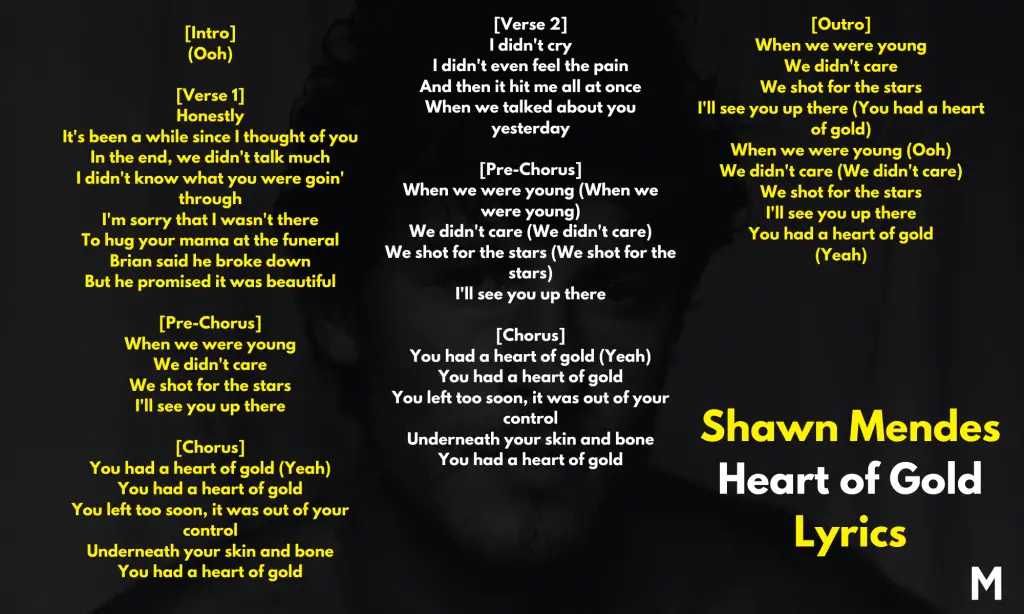Table of Contents
Image C/O Shawn Mendes
Shawn Mendes’s new single “Heart of Gold” dives deep into themes of loss, friendship, and remembering those who’ve left an impact. Dedicated recently to Liam Payne, Mendes’s emotional performance in New York City added a layer of real-world poignancy to the song, making it not just about grief but also about honoring the memory of those who’ve shaped us. In this article, I’ll be using my background in creative writing to take a deeper, more artistic look at the lyrics of “Heart of Gold” and examine what Mendes might be saying about friendship and legacy. To do this, I’ll bring in insights from movies like Coco, The Fault in Our Stars, and A Monster Calls—each of which tackles grief, memory, and celebration of life in its own unique way.
Of course, these are just my own interpretations and takeaways, but I hope this approach offers a fresh perspective on the song. Exploring the lyrics through the lens of film and literature gives us a good excuse to stretch the literary comparisons and dig into what both classic and modern stories have to say about grief and memory. Let’s see how art across mediums can help us uncover the song’s deeper and timeless meaning.
See Shawn Mendes Live On Tour Here👈
Snag Shawn Mendes On Vinyl Here👈
Shawn Mendez Heart Of Gold Lyrics
Shawn Mendez Heart Of Gold Meaning:
Alright, let’s go line-by-line through these lyrics, pulling in examples from Coco, The Fault in Our Stars, and A Monster Calls to highlight how these films and the song explore grief, memory, and the legacy of those we’ve lost. Each film gives us a new way to understand these lyrics and the singer’s journey of remembering a friend with a “heart of gold.”
“Honestly, It’s Been a While Since I Thought of You”
The song begins with a simple but powerful admission: the singer hasn’t thought of his friend in a while. This honest line captures the regret we sometimes feel for letting memories slip. In the song, this distance makes him feel guilty and sad about not being there for his friend when they needed him.
This theme is also a big part of Coco. In the movie, Miguel’s family believes in remembering their ancestors to keep their spirits alive. The line “It’s been a while since I thought of you” reminds us that forgetting someone can feel like losing them all over again, similar to how Miguel’s family believes in the importance of memory.
In Coco, if people are forgotten, they disappear entirely from the Land of the Dead. This idea shows how important memory is to keep the people we love close, even if they aren’t physically with us. In both the song and Coco, memory and regret are strongly tied together, making us realize that remembering someone keeps them alive in our hearts.
https://youtube.com/watch?v=-Nes-XI3-Ps&si=niBpJMD6_5zj4yc6
“I’m Sorry That I Wasn’t There To Hug Your Mama at the Funeral”
When the singer apologizes for missing the funeral, he’s confronting his own regret and guilt. He knows he wasn’t there when his friend’s family needed him most, and that realization hurts.
In The Fault in Our Stars, the character Hazel goes through a similar experience. She says, “I’m a grenade, and at some point, I’m going to blow up, and I would like to minimize the casualties.” This line reflects Hazel’s guilt and fear about hurting others. She feels the same kind of regret and helplessness that the singer is feeling here. She doesn’t want to leave her loved ones with pain, just as the singer regrets not being there for his friend’s family. In both the song and the movie, characters face the truth that sometimes we don’t get to be there for people in the way we wish we could.
But the regret they feel makes them appreciate those they love even more.
“When We Were Young, We Didn’t Care, We Shot for the Stars”
In the pre-chorus, the singer reminisces about when they were young and didn’t have a care in the world. “We shot for the stars” paints a picture of big dreams and endless possibilities. This line shows how they lived with hope and ambition, believing they could achieve anything.
This line reminds me of The Fault in Our Stars, too, where Hazel and Augustus share their hopes despite their limitations. Augustus says, “You gave me a forever within the numbered days.” Even though they know their time together is limited, they still dream big and hope for a meaningful life. Like the characters in The Fault in Our Stars, the singer and his friend were fearless in their youth. They “shot for the stars” just like Hazel and Augustus tried to make the most of their days. The line “I’ll see you up there” suggests that, even though his friend left too soon, he imagines they’ll reunite someday, keeping the dream of their friendship alive.
“You Had a Heart of Gold”
This line is repeated in the chorus, emphasizing the friend’s kindness and good nature. Calling someone a “heart of gold” is a way to say they were truly kind, selfless, and special. The singer wants to make sure that his friend is remembered for the good they brought into the world.
In A Monster Calls, Conor’s mother teaches him to face his emotions, even the hard ones. She tells him, “You be as angry as you need to be.” This advice allows Conor to process his grief and pain, just as the singer in the song is finally processing his grief by remembering his friend’s “heart of gold.” Conor’s mother, like the friend in the song, is someone who has a lasting impact. She’s strong, loving, and caring, and her advice stays with Conor even after she’s gone.
In both the song and the movie, characters honor the memories of their loved ones, finding comfort in their lasting goodness and love.
“You Left Too Soon, It Was Out of Your Control”
This line shows the singer’s sadness over his friend’s unexpected departure, recognizing that it was something neither of them could control. This feeling of helplessness in the face of loss is common, and it’s a reminder of how fragile life can be.
In The Fault in Our Stars, Hazel faces this same uncontrollable reality with Augustus’s death. He passes away too soon, leaving Hazel to struggle with the void he left behind. She says, “Grief does not change you… it reveals you.” Both Hazel and the singer in this song learn to live with the loss by facing it head-on. They learn that, even though they couldn’t control what happened, they can still choose to remember and honor the impact their loved ones had on them.
“And Then It Hit Me All at Once”
The singer finally feels the full weight of his friend’s death, saying, “It hit me all at once.” Sometimes grief is like that—it doesn’t come right away but builds until we’re ready to face it. This moment of realization captures how grief works in surprising ways.
In A Monster Calls, Conor also faces this delayed realization. Throughout the movie, he’s angry, confused, and scared, but he doesn’t fully understand his feelings until his mother is gone. His story is about finally facing the truth of loss, just as the singer does here.
Conor’s journey shows us that it’s okay for grief to come slowly, that it’s part of understanding how much someone meant to us. In both the song and the movie, the characters don’t fully face their loss until later, which makes the moment of realization even more powerful.
“When We Were Young, We Didn’t Care; We Shot for the Stars”
The song ends by bringing back this nostalgic memory of their youth and dreams. The singer says, “I’ll see you up there,” as if he’s promising to remember and honor his friend’s dreams even though they’re gone. It’s a hopeful way to end the song, focusing on the shared memories that will always stay with him.
This feeling is captured well in Coco, where Miguel sings, “Remember me, though I have to say goodbye.” Both the song and Coco show that honoring memories helps keep our loved ones close. The singer here is doing the same thing, holding onto the past while looking toward the future, believing he’ll be reunited with his friend someday.
Themes And Takeaways
To wrap things up, let’s look closer at the themes, meanings, and main takeaways of “Heart of Gold” and how they connect with some powerful themes from films like Coco, The Fault in Our Stars, and A Monster Calls. Each of these works explores grief, memory, and how we carry forward the legacy of those we’ve lost—making them apt companions to Mendes’s lyrics. Mendes uses the song to explore how friendship, memory, and personal legacy create a lasting impact, even after someone is gone.
Recently, Mendes performed this song in honor of Liam Payne, emphasizing that “Heart of Gold” is about celebrating loved ones as much as it’s about grieving them. It’s a message about embracing their kindness, dreams, and lasting influence, not just focusing on the loss itself.
In Coco, this idea is central: remembering and honoring those who’ve passed helps keep them alive in our hearts. When Miguel’s family in Coco practices Día de los Muertos traditions, they are able to bridge the gap between worlds to keep their loved ones’ memories alive. Miguel’s abuelita tells him, “Nothing is more important than family,” capturing the same reverence for memory that Mendes conveys with lines like, “You had a heart of gold.” In both cases, memory isn’t just about nostalgia but serves as a way to honor someone’s kindness, the good they did, and the way they touched the lives of others. It’s about celebrating their unique light—a theme that Mendes expressed in his tribute to Payne, when he called him a “beautiful soul.”
Similarly, in The Fault in Our Stars, Hazel and Augustus’s journey explores how even short lives can leave lasting legacies. Hazel’s line, “You gave me a forever within the numbered days,” resonates with Mendes’s lyrics, particularly when he sings, “You left too soon, it was out of your control.”
Both works confront the heartbreaking truth that life is often out of our hands, but that doesn’t erase the mark a person leaves behind. In A Monster Calls, we see young Conor struggling with similar feelings, as he learns to understand and accept his mother’s legacy and the depth of his own grief. Mendes’s choice to dedicate “Heart of Gold” to Payne, even referring to him as “brother,” brings these themes full circle: despite the loss, we honor those we love by remembering who they were and what they left behind. Ultimately, Mendes, like the characters in these films, reminds us that memory and legacy live on even when people are gone.
The post Shawn Mendes Heart of Gold Lyrics and Meaning: Pop Culture Connections to Grief and Memory appeared first on Magnetic Magazine.






